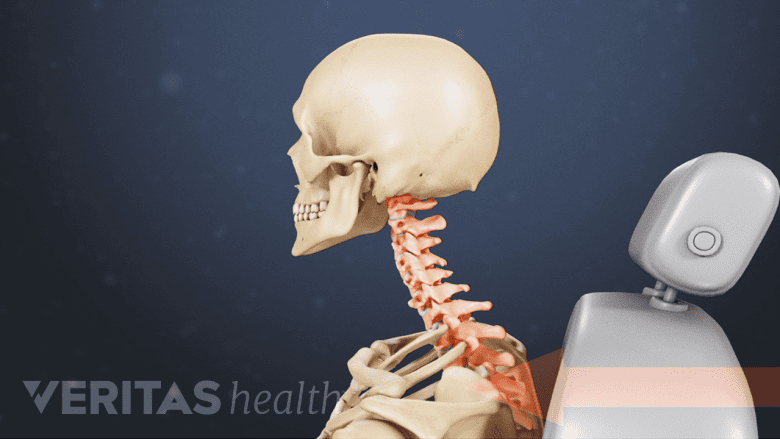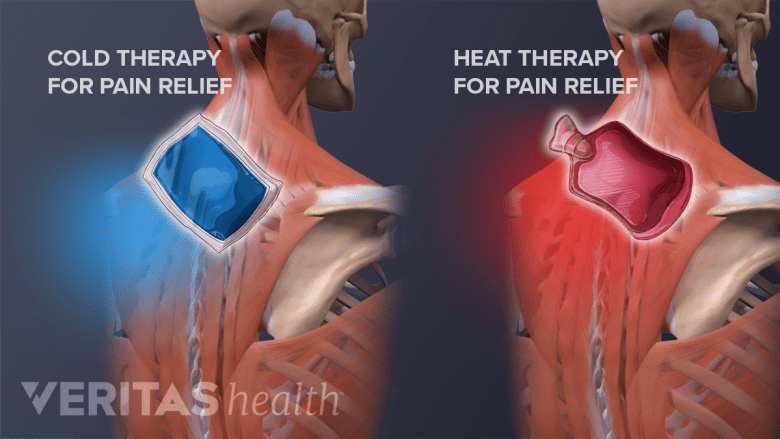Waking up with a stiff neck can be unexpected and inconvenient. Despite a stiff neck’s potential for severe, sharp pain and reduced range of motion, some people might feel pressure to maintain the day’s planned activities, such as going to work or class. Below is an explanation of how a stiff neck might develop during sleep, as well as strategies for finding quick relief before making a decision as to what can be realistically accomplished during the day.
In This Article:
How Neck Stiffness Develops During Sleep
Whiplash injuries can cause delayed pain and stiffness, often emerging during sleep.
Some ways that stiff neck can develop while sleeping include:
- Awkward angle. The head or neck might settle at an awkward angle for an extended period of time while sleeping, which can stretch and stress muscles, ligaments, and joints beyond their normal limits.
- Sudden movement. Perhaps from rolling over or reacting to a dream, sudden neck movements might occur while sleeping that can strain or sprain the neck.
- Preexisting injury. Some injuries that happen while awake, such as whiplash, may take many hours before pain and stiffness develop later while sleeping.
Most commonly, the root cause of a stiff neck is a neck strain, which could be due to a muscle strain or ligament sprain. Several other causes could exist, such as facet joint osteoarthritis or cervical degenerative disc disease.
Remedies for a Stiff Neck After Waking Up
Some remedies for a stiff neck in the morning include:
Ice or heat therapy
Ice and heat therapy may help alleviate neck stiffness.
Applying ice shortly after a neck strain may help limit the swelling. Ice applications tend to be best for 10 to 20 minutes at a time. Heat therapy, such as taking a warm shower or using a heating pad, helps loosen and relax the muscles, which may also reduce pain and improve range of motion.
Watch How to Apply Heat Therapy for Neck Pain Relief Video
Over-the-counter pain medication
OTC medication may provide temporary relief from neck pain by reducing inflammation.
If the pain and stiffness are bad enough to significantly limit movement in one or more directions, taking an over-the-counter medication may be advised. Some examples could include ibuprofen, naproxen, or acetaminophen.
Gentle stretching or self-massage
Stretching provides pain relief by loosening the stiff muscles and ligaments of the neck.
After finding some initial pain relief, further loosening of the muscles and ligaments may be achieved with some stretching and/or massage. Some stretches cannot fully be completed due to the neck’s pain and stiffness, which is OK. The goal is to gradually increase the flexibility without causing more pain. Similarly, the hand and fingers can be used to massage the neck’s sore area so long as it does not increase pain.
See 4 Easy Stretches for a Stiff Neck
Pain assessment and activity modification
After being awake for a while and applying these stiff neck remedies, an assessment can be made as to whether the pain and stiffness are improving. If neck stiffness still prevents significant amounts of movement in one or more directions, or is still exhibiting sharp or burning pain, it is advised to avoid any strenuous activities for the day and limit movements that increase pain. Walking and moving around are still encouraged, because full bed rest may cause the stiff neck and pain to last longer.
Watch: 3 Evening Tips for Sleeping with Neck Pain Video
Sometimes a stiff neck might start to improve shortly after applying treatments, but other times it might take a day or two before noticeable pain relief is achieved. A stiff neck typically resolves within a week’s time.
How to Prevent a Stiff Neck While Sleeping
Not all neck stiffness can be prevented, but steps can be taken to reduce the chance of developing one.
- Consider sleep position. Sleeping on the stomach puts more stress on the cervical spine because the head is pushed to one side or the other. If possible, it is recommended to sleep on the back to put the least amount of stress on the cervical spine. Another option is to sleep on the side. For some people, sleeping in a reclined position, whether it is in a reclining mattress or chair, offers more comfort for the neck.
- Find the right pillow. Just like sleep position, no one type of pillow is best for everyone. For people who sleep on the back, placing a rolled towel or cervical pillow beneath the cervical spine may provide better support. Side sleepers may benefit from placing an additional pillow between the knees to keep the spine more aligned. Finding the right pillow typically involves some trial and error.
- Keep the temperature comfortable. Many people report waking up with a stiff neck after having cool air blow on them for the night, such as from a fan, vent, or open window. While the medical literature has not examined this specific topic in detail, some people may benefit from arranging the sleep environment to avoid cool air blowing directly onto the neck.
Several other factors can reduce the risk for a stiff neck or other aches from sleeping, such as having a firm enough mattress. It should also be noted that falling asleep in places that are not conducive to good sleep, such as a chair or couch while watching TV, may increase the likelihood of waking up with a stiff neck.
When Waking Up with a Stiff Neck Is Serious
If waking up with a stiff neck is also accompanied by a severe headache, fever, arm numbness, tingling or weakness or other troubling symptoms, medical attention must be sought immediately.









